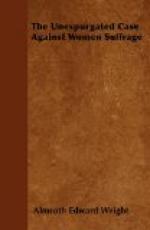Wherever we look we find aversion to compulsory intellectual co-operation with woman. We see it in the sullen attitude which the ordinary male student takes up towards the presence of women students in his classes. We see it in the fact that the older English universities, which have conceded everything else to women, have made a strong stand against making them actual members of the university; for this would impose them on men as intellectual associates. Again we see the aversion in the opposition to the admission of women to the bar. But we need not look so far afield. Practically every man feels that there is in woman—patent, or hidden away—an element of unreason which, when you come upon it, summarily puts an end to purely intellectual intercourse. One may reflect, for example, upon the way the woman’s suffrage controversy has been conducted.
Proceeding now on the assumption that these things are so, and that man feels that he and woman belong to different intellectual castes, we come now to the question as to whether it is man who is selfish when he excludes women from his institutions, or woman when she unceasingly importunes for admittance. And we may define as selfish all such conduct as pursues the advantage of the agent at the cost of the happiness and welfare of the general body of mankind.
We shall be in a better position to pronounce judgment on this question of ethics when we have considered the following series of analogies:
When a group of earnest and devout believers meet together for special intercession and worship, we do not tax them with selfishness if they exclude unbelievers.
Nor do we call people who are really devoted to music selfish if, coming together for this, they make a special point of excluding the unmusical.
Nor again would the imputation of selfishness lie against members of a club for black-balling a candidate who would, they feel, be uncongenial.
Nor should we regard it as an act of selfishness if the members of a family circle, or of the same nation, or of any social circle, desired to come together quite by themselves.
Nor yet would the term selfish apply to an East End music hall audience when they eject any one who belongs to a different social class to themselves and wears good clothes.
And the like would hold true of servants resenting their employers intruding upon them in their hours of leisure or entertainments.
If we do not characterise such exclusions as selfish, but rather respect and sympathise with them, it is because we recognise that the whole object and raison d’ etre of association would in each case be nullified by the weak-minded admission of the incompatible intruder.
We recognise that if any charge of selfishness would lie, it would lie against that intruder.
Now if this holds in the case where the interests of religious worship or music, or family, national, or social life, or recreation and relaxation after labour are in question, it will hold true even more emphatically where the interests of intellectual work are involved.




